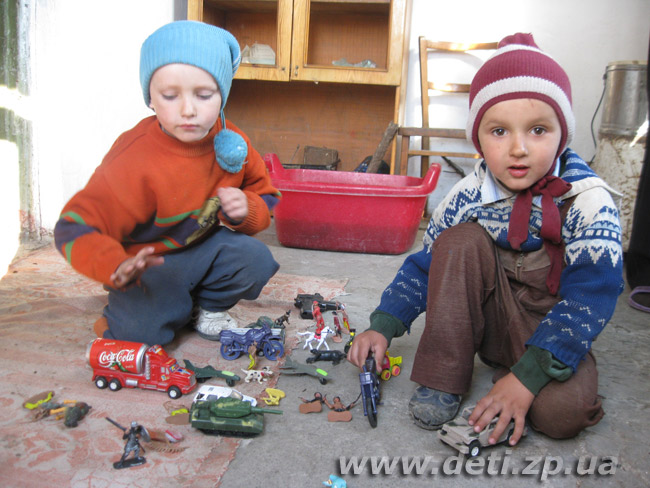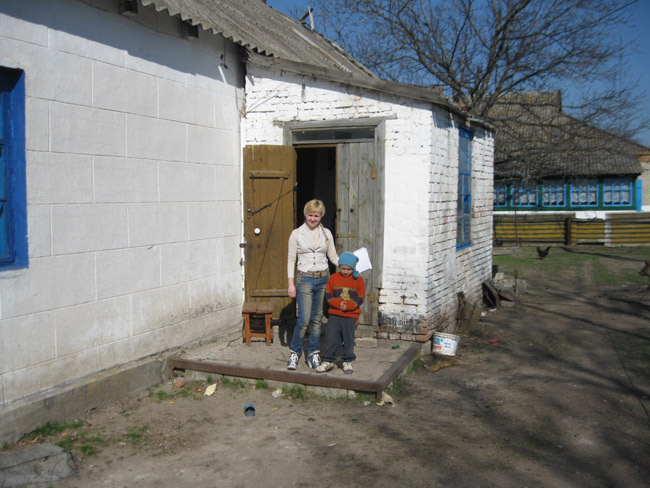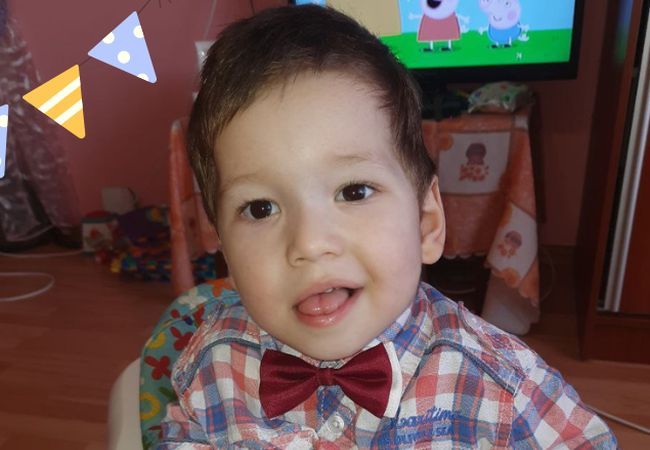
Hundreds of families in the Zaporizhia region who are stuck in difficult financial situations live in such houses
For the last two months we travelled through more than twenty remote villages in the Zaporizhia region in order to find families who are inclined to take their children to orphanages. Usually these families are large, low-income, or single-parent. Unfortunately, we did not have to spend much time before we found such a family, as they live in almost every village.
The picture of this family looks like this: a single mother who raises from 2 to 5 children alone with a low family income of sometimes only 500 hryvnyas or 62 US dollars (even a garden doesn’t really help to solve the problem.) Like in most villages there are practically no jobs and state social benefits are often the only way to survive. When one sees such tough living conditions, one starts to realize why some parents don’t think twice before taking their children to orphanages and why they turn to alcohol abuse.

Oksana has two children who don’t attend a kindergarten because she cannot pay 100 hryvnyas (12 US dollars) a month for the meals there. She cannot even register at the regional job center because she hasn’t got any secondary education. It’s time for her older son to prepare for school, but Oksana doesn’t have any idea how she can afford it

It goes without saying that Oksana’s sons would rather stay with their family than in an orphanage. Although every month the Ukrainian government spends 4, 500 hryvnyas (558 US dollars) for every child in an orphanage, it somehow cannot socially and financially support such low income families

After seeing such a hard reality, we at first thought of bringing such families lots of clothes, toys and food and support them a little bit in this way. Most warm-hearted people and donors feel the same.
But one cannot feed a person for the rest of his or her life. Tomorrow he or she will be hungry again. Such free lunches will turn them in staunch dependents. What should be done?
The fundamental goal of social support is creating conditions in which people can live their lives with dignity, develop and use their skills, and the most importantly, become independent members of society. So, we have got an idea.
On the one hand, a family who is experiencing a difficult financial situation needs some support from a specialist who could help them plan their time, resources, and organize the upbringing and recreation of their children. The task is to find good specialists (teachers, psychologists, doctors and so on) for solving family crisis. On the other hand, poor families need money. And it’s rather challenging to create jobs; and what’s more it’s outside our competence. But…
We have a good idea. There is a neglected territory in every village which should be regularly cleaned like overgrown streets with weeds, rubbish piles and ruining buildings. Local authorities have no money to finance these jobs.
We have decided to take some problem families under our patronage: to make a thorough rehabilitation plan, to invite a specialist for social-psychological assistance and provide the parents with public jobs in their own villages, so they will have an opportunity to earn some little money. If parents are addicted to alcohol, they will get their salary in the way of food or clothes for their children and we will simultaneously try to help them to beat their alcohol addiction.
We hope this will cause at least some families to keep their children. Our Charity Foundation is ready to take responsibility for financing the salaries of the parents who face difficult life circumstances and also the work of social workers who will support them. If you would like to make monthly donations for this project, it would help us save families who can hardly make their ends meet.
The Ways to Transfer Your Donations for Crisis Families
The Needs of Low-income and Large Families
You can ask any questions by contacting the employees of “The Happy Child” Charity Foundation


Within the walls of this house live three children and their alcoholic mother. The family income is 500 hryvnyas (62 US dollars) a month

This is a house of another problem family. Mom and Dad can sit near the house all day long but it never comes to their minds to clean and plant something around

This couch is the best sleeping place in the house


Some families live in these conditions
The Commentaries of Vita Mochalova:
An orphanage (from Latin internus – inside) – is an educational institution with a 24 hour residence for its pupils. It’s focused on supporting families raise their children and develop practical skills to achieve an independent life.
This is a dictionary definition. In fact, the real situation does not look so bright. Half of the orphanage pupils face some kind of abuse – emotional, physical as well as sexual. An orphanage teaches children nothing more than how to live in the orphanage. Alas, “skills of independent life” in orphanage conditions – is another myth. Graduating orphanage students are not prepared for adult life, cannot communicate, solve basic domestic problems, plan their expenses and organize their lives. The statistics of the Ministry of Ukraine for Family, Youth and Sports looks rather depressing:
- Just 25% of orphanage graduating students have a permanent job;
- Just 1% of orphanage graduating students get higher education;
- Every fifth orphanage graduating student becomes homeless;
- Every seventh orphanage graduating student attempts suicide;
- 50% of former orphanage students get behind the bars;
- 76% of orphans are afraid of leaving their orphanage;
- 70% of children in orphanages think they will not be able to get a good education and profession they dream about…
Some family type homes started to be actively developed in Ukraine some years ago. But since 2009 the policy has changed. And in June 2010 the Ukrainian Prime Minister Nikolay Azarov set an order to strengthen the orphanage system. He also ordered an examination into the possibility that children from low-income families could study in orphanages in cases if their family situations don’t allow them to grow in an environment that promotes their healthy development.
The UN Committee experts on Children’s Rights carefully studied the situation in Ukraine. Although they admitted a noticeable decrease of court decisions on depriving parental rights for the last three years, they are still deeply concerned about a high percentage of cases of children who are deprived of a family atmosphere. The UN Committee is also confused about the small number and bad quality of state services which are focused on protecting and supporting families with children. There is another concern about the absence of monitoring and the efficiency of such services.
Simply speaking, we’re experiencing a catastrophe. And the fact that courts do not deprive parents of their rights so often is not an indication that more parents are dealing with their problems by themselves. The court judges just prefer to shut their eyes to the problems of many families.
And this is not all. Orphanages that received the right to keep “family” children organize teams of agitators that persuade parents experiencing financial difficulties to take their children to the orphanage. The orphanage can provide children with five meals a day with meat included every day, clothing and computer classes. It’s easy to persuade a woman whose main task is to feed her 2-3 children for just 500-600 hryvnyas (62-74 US dollars) a month. In case of refusal the orphanage staff threatens to deprive the parent(s) of their parental rights. This new policy enabled empty orphanage classes to be filled with children within a few weeks. Therefore, the situation of children’s rights has not improved, but has even got worse. Family children who are forced into orphanages, unlike real orphans, who are legally deprived of parents’ care, have no rights to be adopted. Such family children have an orphan status with official parents.
It seems like our orphanage battle is not really effective: instead of one adopted child can come 2-3 family children from neighbouring villages.
Social orphanage control is one of today’s most important issues, but almost no one wishes to deal with. It’s much easier to prevent orphanhood than to find a family for a child. One can hardly deny this fact, but there is little monetary aid, no real specialists and no good programs. Our Charity Foundation cannot and doesn’t have to take the place of our government and take its functions. But we also do not want to stand by this problem which threatens us with a real disaster in the near future.



